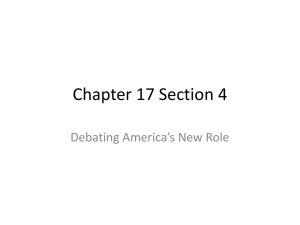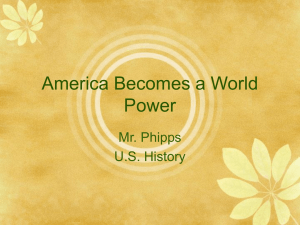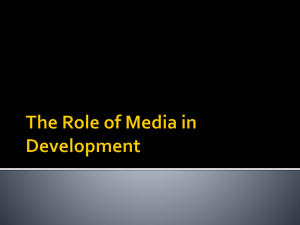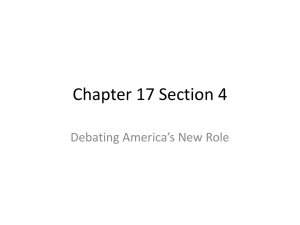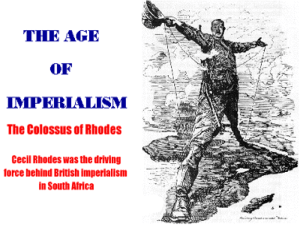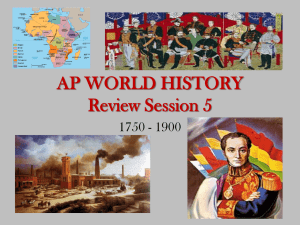Industrial Revolution and Imperialism
advertisement
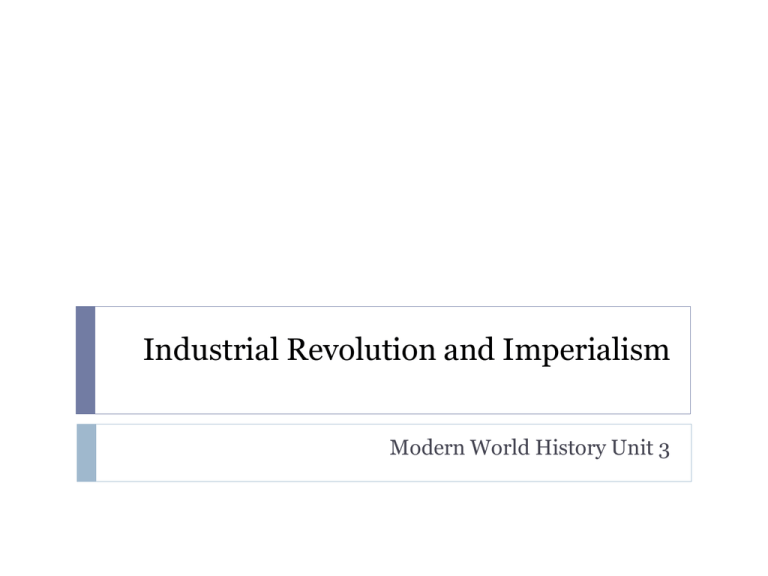
Industrial Revolution and Imperialism Modern World History Unit 3 Unit Enduring Understandings The motives of competition and profit often prompt people and groups to expand into new areas of opportunity. Changes in technology and exchange during the 18th and 19th centuries led to the social and economic changes around the world that are still relevant today. Technology, transportation and communication enabled European nations to become the dominant world powers in the 19th century. Centers of global economic and political power shift over time. Technology and industrial advancement can alter existing social and economic systems. Unit Essential Questions How can nationalism be a unifying and a divisive force? How does a state gain or lose power over others? How should resources and wealth be distributed? Why do political revolutions occur? Romanticism Assignment: Read the article and answer the following questions on a separate sheet of paper. After reading the opening paragraphs, list 4 characteristics that generally define Romanticism. How is nationalism connected to folklore, therefore making it an aspect of Romanticism? What is the most popular emotion celebrated by Romantics? How has this emotion played an influential role in the history of the world? How does individualism connect with 18th Century Romanticism? What class gained a strong individual nature? What is the paradox (contradiction) created with the romantic focus on nature during the Industrial Revolution? #1: Romantic or Realism? “It was the best of times, it was the worst of times, it was an age of wisdom, it was the age of foolishness, it was the epoch or belief, it was the epoch of incredulity, it was the season of Light, it was the season of Darkness, it was the spring of hope, it was the winter of despair, we had everything before us, we had nothing before us, we were all going direct to heaven, we were all going the direct other way-in short, the period was so far like the present period, that some of its noisiest authorities insisted on being received, for good or for evil, in the superlative, degree of comparison only.” #2 #3 #4 “On an afternoon in October, or the beginning of November — a fresh watery afternoon, when the turf and paths were rustling with moist, withered leaves, and the cold blue sky was half hidden by clouds — dark grey streamers, rapidly mounting from the west, and boding abundant rain — I requested my young lady to forego her ramble, because I was certain of showers. She refused; and I unwillingly donned a cloak, and took my umbrella to accompany her on a stroll to the bottom of the park: a formal walk which she generally affected if low-spirited — and that she invariably was when Mr. Edgar had been worse than ordinary, a thing never known from his confession, but guessed both by her and me from his increased silence and the melancholy of his countenance. She went sadly on: there was no running or bounding now, though the chill wind might well have tempted her to race. And often, from the side of my eye, I could detect her raising a hand, and brushing something off her cheek. I gazed round for a means of diverting her thoughts. On one side of the road rose a high, rough bank, where hazels and stunted oaks, with their roots half exposed, held uncertain tenure: the soil was too loose for the latter; and strong winds had blown some nearly horizontal. In summer Miss Catherine delighted to climb along these trunks, and sit in the branches, swinging twenty feet above the ground; and I, pleased with her agility and her light, childish heart, still considered it proper to scold every time I caught her at such an elevation, but so that she knew there was no necessity for descending. From dinner to tea she would lie in her breeze-rocked cradle, doing nothing except singing old songs — my nursery lore — to herself, or watching the birds, joint tenants, feed and entice their young ones to fly: or nestling with closed lids, half thinking, half dreaming, happier than words can express.” #5 #6 Industrial Revolution Assignment Look closely at the word cloud pictured on the screen. Complete the chart by listing embedded words that fit the categories listed in the chart. Countries/ Locations Social Words Economic Words Descriptive Words 5 Largest in Size After analyzing the information presented in the word cloud, write a sentence summarizing what you might expect the Industrial Revolution to be about. Industrial Revolution Industrial Revolution Overview A time of greatly increased output of machine-made goods drastically changing the way people lived and worked Began in ENGLAND but quickly spread through Europe and to the US Industrial Revolution Causes Agricultural Revolution ENCLOSURES Forced small farmers off land to create large farms Done to INCREASE PRODUCTION as population increased Forced small farmers to the cities Crop Rotation Rotation of crops to different fields each season produced HIGHER crop amounts Industrial Revolution Causes Scientific Revolution Scientific discoveries, new machines, printing press, exploration, etc. Industrial Revolution Why England? Large population of workers due to enclosure Abundant natural resources Water power Coal and iron ore Rivers for inland trade Many harbors for international trade Political/Economic Stability Isolated from European wars Parliamentary system successful for hundreds of years Parliament monetarily supported entrepreneurs Financially successful colonies with abundant resources England 1701 & 1911 Industrial Revolution Effects Greater need to move goods TRANSPORTATION rapidly improved Better roadways, canals, tunnels, etc. Steam engine Steam boats Railroads Extensive systems become necessity Factory engines Locomotives Industrialization Industrialization Industrialization Overview Process of SOCIAL and ECONOMIC change that modernizes a human group Social change and economic development are closely related with TECHNOLOGICAL INNOVATION Urbanization Urbanization Industrialization Effects of Industrialization GROWTH OF INDUSTRIAL CITIES Factories for efficient production Urbanization: rapid movement to cities POOR LIVING CONDITIONS Small cities became too big too fast Poor sanitary conditions Insufficient housing, education, security Air and water pollution Living Conditions: Tenements Slums of Urbanization Industrialization Effects of Industrialization (cont.) POOR WORKING CONDITIONS 14 hour days, 6 days/week, poor pay Workers had to keep up with machines Child Labor Child Labor Poor Working Conditions Industrialization Effects of Industrialization (cont.) Class Tension Rise of middle class Upper-middle class factory owners and merchants grew wealthy and influential in politics Lower-middle class factory foremen, skilled tradesmen, supervisors lived comfortably Many living in extreme poverty and working class begins to replace peasant class Aristocracy resents upper-middle class Being pushed out of power Workers resent upper-middle class Gap between classes getting larger Assignment Write a one-page letter that captures “a day in the life of” a worker living in England during the Industrial Revolution. Your letter can be written from one of the following perspectives: Upper-Class: A landowner/aristocrat that formerly occupied the top position in British society. Middle-Class: An skilled worker/professional/businesspeople/wealthy farmer that has greatly benefited from one of the following: a new industry in London; the iron-smelting centers in Birmingham or Sheffield; or the textile industries in Leeds and Manchester Lower-Class: A factory worker working in horrible conditions YOUR LETTER MUST COMMENT ON THE CLASS TENSIONS OPERATING DURING THIS TIME! Use pages 258-262 to aid you… Global Impact of Industrialization Global Impact of Industrialization Global Impact of Industrialization Moved through Europe and to the US (West) More demand for products motivated colonization to gain raw materials IMPERIALISM Global Impact of Industrialization Global Impact of Industrialization (cont.) Global Inequality Industrialized WEST vs. “ALL THE REST” Great economic and military inequalities Transformation of Society Great economic power of EUROPE More wealth overall Better opportunities for education and democracy Global Impact of Industrialization Global Impact of Industrialization (cont.) Emergence of new political and economic ideologies Business leaders encouraged gap between rich and poor LAISSEZ-FAIRE: “hands-off” economy Promotion of CAPITALISM Reformers encouraged governments to play a more active role in bettering conditions Emergence of SOCIALISM and COMMUNISM ECONOMIC SYSTEM: policies of production, distribution and consumption of goods and services Political and Economic Ideologies Political and Economic Ideologies Capitalism Economic system in which money is invested in business ventures with the goal of making a profit, economic liberty guarantees economic progress ADAM SMITH Father of modern capitalism Other capitalists included Malthus Wars and epidemics necessary to reduce excess population reduce number of poor Ricardo Permanent underclass always poor Wages forced down as population increase SUPPLY AND DEMAND Political and Economic Ideologies Socialism Factors of production are owned by public and operate for the welfare of all Government actively plans economy Other socialist ideas include Bentham UTILITARIANSIM judge ideas, institutions and actions on the basis of their utility or usefulness Government should provide the greatest good for the greatest amount of people Political and Economic Ideologies Karl Marx Believed that economic forces controlled society Wrote the Communist Manifesto (1848) calling for “workers of the world unite” and overthrow the “bourgeoisie” Radical socialism called Marxist Gap between rich and poor too wide and will widen More control over economy will reduce class conflict Marxism Factories drive small artisans out of business Small # of manufacturers to control wealth Large PROTELTARIAT would revolt & seize factories Marxism Proletariats would produce what was NEEDED Workers would share profits Creation of economic equality Marxism Workers would control gov’t in “Dictatorship of the Proletariat” Create cooperative living and education The state/government would wither away = classless society Political and Economic Ideologies Karl Marx (cont.) Marx’s final phase would become COMMUNISM Complete form of socialism in which the means of production owned by the people No private property Classless society All goods and services shared equally Political and Economic Ideologies Karl Marx (cont.) Marx’s ideas of communism didn’t have much appeal until 20th century Lenin’s Russia Mao’s China Ho Chi Minh’s Vietnam Castro’s Cuba Most of Marx’s predictions never occurred proving that society is not just controlled by economic forces but also by religion, nationalism and political forces Imperialism IN WHAT WAYS DO YOU BELIEVE IMPERIALISM CONNECTS TO INDUSTRIALIZATION? Imagine for a moment… That you are at home engaged in one of your favorite activities; playing a game, listening to music, or reading. So far the day is as any other. Then all of the sudden a group of individuals arrive at your front door demanding that you stop what ever you are doing. These individuals tell you that your way of life is wrong. They inform you however that they have come to your house to correct your way of life. They say it is their responsibility to change your way of living for the better. You find out that this has happened not only to you but your neighbors as well. Over time your way of life does change. These individuals, who you do not even know, have changed your government, religion, and other cultural practices, and remember these individuals told you this was for your own good. What is your reaction? Let’s refresh our memories… What is a colony? Example… What is nationalism? Example… What occurred during industrialization? These are all components that will materialize in our discussions of Imperialism… Industrialization Imperialism INDUSTRIALISM STIRRED AMBITIONS IN MANY EUROPEAN NATIONS. THEY WANTED MORE RESOURCES TO FUEL THEIR INDUSTRIAL PRODUCTION. THEY COMPETED FOR NEW MARKETS FOR THEIR GOODS. THEY LOOKED TO AFRICA AND ASIA AS SOURCES OF THE RAW MATERIALS AND MARKETS FOR CLOTH, PLOWS, GUNS, AND OTHER INDUSTRIAL PRODUCTS. Imperialism Focus Africa India China Japan Imperialism Imperialism Overview The conquering of a country or territory by a stronger nation with the intent of dominating it politically, economically, socially and culturally Central-core of empire is a nation-state Ex. Great Britain, France, United States Politically? Economically? Socially? Culturally? “The Sun Never Sets on the British Empire” Imperialism British Imperialism British dominated 19th century imperialism Reached it’s height under Queen Victoria Jump start due to early industrialization Originally about economics PRIDE Glorified imperialism in stories, newspapers, poetry Ex. Kipling’s White Man’s Burden Major Rivals: France Germany Belgium RHODES COLOSSUS Cecil Rhodes, shown standing astride of Africa, in a cartoon from Punch magazine; Rhodes had built the trans-Africa railway, and is the man after whom the nation of Rhodesia was named (now Zimbabwe). The cartoon is a play on the old Colossus of Rhodes, which was one of the “Seven Wonders of the Ancient World.”) “We [the British] happen to be the best in the world, with the highest ideals of dependency and justice and liberty and peace, and the more of the world we inhabit, the better it is for humanity.” Imperialism: Perspective “Our whole existence has been controlled by people with an alien attitude to life, people with different customs and beliefs. They have determined the form of government, the types of economic activity, and the schooling which our children have…A man who tries to control the life of another does not destroy the other any less because he does it, as he thinks, for the other’s benefit. It is the principle which is wrong, the principle of one man governing another without his consent.” -Julius Nyerere of Tanzania Imperialism Motives Driving Imperialism Nationalism Viewed an empire as a measure of national greatness “All great nations in their fullness of their strength have desired to set their mark upon barbarian lands” Economic Competition European Racism Idea that the white race was superior to others Social Darwinism those that were fittest for survival enjoyed wealth and successes and were considered superior to others Imperialism Motives Driving Imperialism Missionary Impulse Desire to Christianize people Believed European rule was the best way to end evil practices (i.e. slave trade) Imperialism External Factors - Maxim gun - Railroads/Steamships - Cure for malaria Internal Factors - Variety of cultures and languages - Low level of technology - Ethnic strife Racism Racism Before Reading: Define the term race in your own words. When you think of the word race, what comes to mind? Record a bulleted list of words and/or characteristics that you associate with the idea of race. Add in bullet points as needed. Is race real? Does it exist? Justify your answer in the space below. Racism Post-Reading: How did your idea of race change? Do you agree with the ideas listed in these handouts? Why or why not? What was the most surprising statement? Why? How might this new understanding change the way you think about others? Assignment: White Man’s Burden by Rudyard Kipling Take up the White Man’s burden— Send forth the best ye breed— Go, bind your sons to exile To serve your captives’ need; To wait, in heavy harness, On fluttered folk and wild— Your new-caught sullen peoples, Half devil and half child. According to Kipling, what is the “White Man’s burden”? The white man’s burden- The Journal, 1899 Detroit Berlin Conference Assignment Based on the cartoon pictured, discuss with the person sitting next to you the following two questions 1. According to this cartoon, which European countries were fighting for a position in Africa? 1. How did the Berlin Conference lead to the situation shown in the cartoon? Imperialism Berlin Conference (1884-85) European conference that met to lay down rules for the division of Africa Agreement Any European country could claim land in Africa by notifying other nations of their claims and showing they could control the area No African ruler attended meetings Berlin Conference Simulation Welcome to the Berlin Conference of 1884-85! Background: In the late 1800s a meeting of European powers was held to divide Africa among those nations represented. During this time they agreed that any European country could claim land in Africa by notifying other nations of their claims and showing they could control the area. You will simulate this exercise and work in groups of four (4) to partition the African continent. Each individual will be assigned two (2) countries below; your task is to negotiate with those other countries around you and reach an agreement as to how Africa should be divided. You are seeking to gain as much territory as possible while still meeting the goal(s) listed below. This exercise requires extensive negotiation and discussion. Each group will produce and submit a copy of the completed African map. It must clearly show the division of the African continent and, more importantly, the territorial holdings of each major European power. Please label and color (lightly) each territory. At the end of the exercise you will then compare your map to the actual map of 1914 Africa. Good luck! Please refer to pages A14 and A15 in your textbook’s atlas, as well as page 308 when answering the reflection questions. Imperialism: Partition of Africa Forms of Imperialism Forms of Imperialism Forms of Imperialism Characteristics Example Colony A country of region governed internally by a foreign power Somaliland in East Africa was a French colony Protectorate A country or territory with its own internal government but under the control of an outside power Britain established a protectorate over the Niger River delta Sphere of Influence An area in which an outside power claims exclusive investment of trading privileges Liberia was under the sphere of influence of the United States Economic Imperialism Independent but less The Dole Fruit company developed nations controlled pineapple trade controlled by private in Hawaii business interests rather than by other governments Forms of Imperialism Indirect Control Direct Control Local government officials were Foreign officials brought in to rule used No self-rule Limited self-rule Goal: assimilation Goal: to develop future leaders Government institutions are based Government institutions are based only on European styles on European styles but many have local rules Examples: British colonies such as Nigeria, India, Burma U.S. colonies on Pacific Islands Examples: French colonies such as Somaliland, Vietnam German colonies such as Tanganyika Portuguese colonies such as Angola Outcomes of Imperialism Imperialism Outcomes of Imperialism Benefits Reduced local warfare Improved sanitation, transportation & communication Provided better medical care Consequences Lost control Lost customs & traditions Famines due to cash crops Unnatural division of continent Imperialism Geopolitics An interest in land for strategic location or product; often leads to conflict European nations interested in specific resources in specific places but not always interested in taking over entire country Examples: canals, oil, water access Outcomes of Imperialism Ottoman Empire Loses Power Unsuccessful vied for power over territories with Europe Many former Ottoman territories gained independence (i.e. Greece, Serbia, Romania, Montenegro, Cyprus, Bosnia, Herzegovina, and land in Africa) Result Countries initiated political and social reforms to block European domination of their land (Persia, Egypt) Egypt and the Suez Canal Persia and Oil Great Britain and Russia divide Persia and have access to oil-rich lands Imperialism in India Imperialism in India Imperialism in Asia India was the largest and most lucrative colony of the entire British Empire. 1600’s British East India Co. began trading in India; over time gaining more economic and POLITICAL control “Jewel in the crown” the most valuable of all the British colonies Imperialism in India Long-Term Effects of Colonization in India Resurgence of nationalism against GB Creation of: Indian National Congress-1855 Mix of all Indians Muslim League-1906 Just Muslim Indians Goal: push for independence and protection of Muslim rights Strong tension continues to develop between Hindus and Muslims as nationalism is on the rise Jungle Book: Lively stories filled with talking animals Rudyard Kipling wrote the famous children’s book, The Jungle Book, in 1893. It was written at the height of British imperialism around the globe. Kipling is known for his great pride in Britain and his support of British imperialism. However, remember, he was a realist in his views. Many of his written works portray this in his characters. The Jungle Book is no exception. The story is set in the jungle of India. Although it is a children’s book, the characters symbolize much of what Kipling believed was right about the British colonization of India. Assignment How do the characters in the movie, The Jungle Book, reflect the actions and intentions of British imperialism in India in the 19th Century? Pay attention to the messages given by each character and how they each may symbolize elements of imperialism. Select THREE characters you feel most comfortable supporting and present your analysis in a threeparagraph essay. Be sure to provide examples from the film to support your analysis. List of Characters Mowgli King Louie Baloo Kaa Colonel Hathi Shere Khan Bagheera Vultures Imperialism in China Imperialism in China Imperialism in China Chinese had firm traditions stable & secure Looked down at outsiders Had strong agricultural economy Foreign traders brought new products – foods – led to population boom in 18th Century Strong mining and manufacturing Many natural resources – salt, tin, silver, iron ore Produced fine silks, cottons, porcelain Imperialism in China Tea/Opium Connection Chinese self sufficient did not need to trade WITH West but did trade TO West British wanted to find a good (product) Chinese would want to buy to improve trade balance OPIUM! Used as pain reliever in Chinese medicine Highly addictive Over 12 million were hooked by 183 Imperialism in China “By what right do they (British Merchants) …use the poisonous drug (opium) to injure the Chinese people?...I have heard that the smoking of Opium is strictly forbidden by your country…Since it is not permitted to do harm to your own country, then even less should you let it be passed on to the harm of other countries.” Lin Zexu, quoted in China’s Response to the West Imperialism in China Opium War The British refused to stop trading OPIUM China begins naval battle with British to stop sale of Opium China easily DEFEATED Effects: Effects HONG KONG given to G.B. Special rights given to G.B. – exempt from trade laws at ports Imperialism in China Issues in China POPULATION had grown dramatically Food supply lacking Government CORRUPTION Opium use INCREASING WHAT’S A NATION TO DO? Overthrow the government, of course! TAIPING REBELLION & BOXER REBELLION Self Strengthening Movement Effects of Instability in China Foreigners import resources for MILITARY China loses control of QUALITY and in trade balance Increasing WESTERN INFLUENCE Public not overly supportive of program Foreigners attack Other countries capitalize on China’s weaknesses Resulting treaties lead to “FOOTHOLDS”—spheres of influence Assignment Use pages 335-339 in text to provide an overview of the causes, effects, and policies that affected China in the 1800s and 1900s. Fill out corresponding graphic organizer! Causes Events/Policies Opium War Taiping Rebellion Self-Strengthening Movement Open Door Policy Boxer Rebellion Effects Imperialism in Japan Assignment Use pages 339-343 in text to provide an overview of the causes, effects, and policies that affected Japan in the 1800s and 1900s. Fill out corresponding graphic organizer! Causes Events/Policies Treaty of Kanagawa Meiji Era begins Sino-Japanese War Russo-Japanese War Annexation of Korea Effects Assignment: Japan Cartoon Create a 4 frame comic strip of Japanese History using Chapter 12-2. Your strip should tell the story of the Japanese and Imperialism. On the back of your cartoon, write a summary of this topic in no more than 3 sentences.



